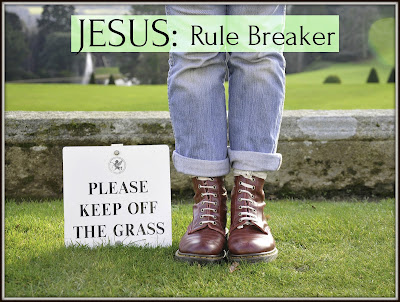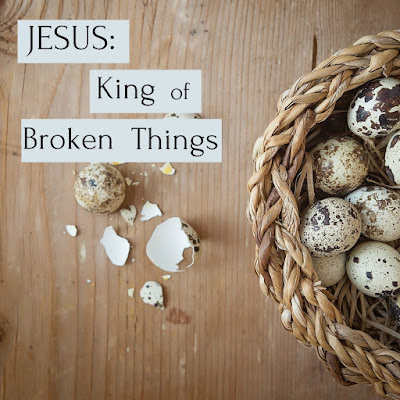Jesus: Rule Breaker
Rule following is comfortable. It gives us a (false) sense of security, enabling us to categorize ourselves and others easily. Rules make it easy to look at someone and know where they belong in society.
Imagine two men waiting at a bus stop. The first is in a dark gray suit. His hair is clipped short. His shoes shine, and his tie is the appropriate shade of red against his starched white shirt. He stands up straight as he sips coffee from an eco-friendly cup.
The second man stands hunched over. His jeans have holes in the knees, and the soles of his shoes have come loose, flapping as he walks. He seems to be wearing every shirt he owns, and he smells as if he hasn't bathed in days--or maybe even weeks.
Societal rules tell us that the first man is an important person. He has a good job. He saves for retirement. His kids go to the "right" schools. He takes family vacations once a year. His cars are always newer models. Our presumption is: He has followed the rules; therefore, he is good. He's safe to socialize with. Most of us would probably invite him and his family over for a grill out.
The second man stinks. We don't want to stand beside him much less invite him into our home. We make assumptions about him. He doesn't have a job. He's probably on drugs. Maybe he dropped out of school. He didn't follow the rules; therefore, he is bad. He's not someone we want to hang out with.
Rules are necessary. We need them in order for society to function. But sometimes rule-following can blind us. It can make us numb, feeding our belief that if our lives resemble t he first man's we are doing something right. God is smiling on us.
he first man's we are doing something right. God is smiling on us.
But where does that leave the second man? Did he do something wrong? Is there some secret sin in his life? No.
Consider Jesus' reaction when he and his disciples came across a man who had been born blind. The disciples asked, "Who sinned, this man or his parents, that he was born blind?" (John 9:1-2) Basically: "Who broke the rules?"
You see the disciples had built their lives around what we call the Old Testament, and it has a lot of rules. What to eat. How to eat it. What to wear. How to wash your hands. Who you could associate with. Who you had to stay away from. It was natural for them to assume someone broke the rules. Why else would this man be born blind?
Jesus' answer must have surprised them. "Neither this man nor his parents sinned," said Jesus, "but this happened so that the works of God might be displayed in him." (John 9:3)
No one broke the rules. Yet as the disciples looked at this man, they decided he was a rule breaker; and therefore, bad.
We do that a lot, don't we? In a split second we decide whether someone is the "right" kind of person based on their appearance or who they associate with--basically, which rules they follow. Sometimes we even take it further. Maybe someone looks ok on the outside, but then we find out which political party they belong to, or which church they attend (or don't attend). All of a sudden this person who seemed alright is anything but.
In the story of the blind man, the disciples immediately classified him as a rulebreaker, as wrong or bad. But it turns out, he hadn't done anything wrong. Neither had his parents. He wasn't a rulebreaker at all, he just looked like one.
However, it turns out there was a rulebreaker in the story. Jesus. One of the Old Testament "rules" was that people were not supposed to work on the Sabbath. It was reserved as a day of rest, and the Jewish leaders of the time took that command very seriously.
Guess what day it was when Jesus healed the blind man? If you said the Sabbath, you're right. Jesus broke the "No work on the Sabbath" rule because he was moved with compassion and mercy.
The Pharisees (religious teachers) were furious. They had been looking for a way to discount Jesus, and when he "worked" on the Sabbath, they thought they had Him. You see they were rule followers. Their entire concept of goodness was based on how well you followed the rules.
Unfortunately, a lot of Christians are like that today. We cherry pick our rules and condemn those who don't follow them. We conflate being right with being righteous. Being right means that you're the winner of an argument. The definition of righteous is: being morally right or justifiable.
Are we made morally right or justified by following rules? Keeping commandments? No. Only through Christ's sacrifice. Through His incredible gift of grace. This is something that can't be earned. Rules can't lead you to grace. Only Jesus can. If we truly believe that we are saved by grace and grace alone we need to stop worrying about being right and start being righteous. Extend to others the grace that Christ extended to us.
Finally, what do you think Jesus said when the Pharisees confronted Him about breaking the Sabbath no-work rule? He said, "I desire mercy and not sacrifice." (Matt. 9:13)
Jesus is a rule-breaker. He will always be more concerned about the state of our heart than the number of rules we've kept. Church, let's try to follow Him and stop valuing rules above mercy, grace, and most of all love.
Imagine two men waiting at a bus stop. The first is in a dark gray suit. His hair is clipped short. His shoes shine, and his tie is the appropriate shade of red against his starched white shirt. He stands up straight as he sips coffee from an eco-friendly cup.
The second man stands hunched over. His jeans have holes in the knees, and the soles of his shoes have come loose, flapping as he walks. He seems to be wearing every shirt he owns, and he smells as if he hasn't bathed in days--or maybe even weeks.
Societal rules tell us that the first man is an important person. He has a good job. He saves for retirement. His kids go to the "right" schools. He takes family vacations once a year. His cars are always newer models. Our presumption is: He has followed the rules; therefore, he is good. He's safe to socialize with. Most of us would probably invite him and his family over for a grill out.
The second man stinks. We don't want to stand beside him much less invite him into our home. We make assumptions about him. He doesn't have a job. He's probably on drugs. Maybe he dropped out of school. He didn't follow the rules; therefore, he is bad. He's not someone we want to hang out with.
Rules are necessary. We need them in order for society to function. But sometimes rule-following can blind us. It can make us numb, feeding our belief that if our lives resemble t
 he first man's we are doing something right. God is smiling on us.
he first man's we are doing something right. God is smiling on us. But where does that leave the second man? Did he do something wrong? Is there some secret sin in his life? No.
Consider Jesus' reaction when he and his disciples came across a man who had been born blind. The disciples asked, "Who sinned, this man or his parents, that he was born blind?" (John 9:1-2) Basically: "Who broke the rules?"
You see the disciples had built their lives around what we call the Old Testament, and it has a lot of rules. What to eat. How to eat it. What to wear. How to wash your hands. Who you could associate with. Who you had to stay away from. It was natural for them to assume someone broke the rules. Why else would this man be born blind?
Jesus' answer must have surprised them. "Neither this man nor his parents sinned," said Jesus, "but this happened so that the works of God might be displayed in him." (John 9:3)
No one broke the rules. Yet as the disciples looked at this man, they decided he was a rule breaker; and therefore, bad.
We do that a lot, don't we? In a split second we decide whether someone is the "right" kind of person based on their appearance or who they associate with--basically, which rules they follow. Sometimes we even take it further. Maybe someone looks ok on the outside, but then we find out which political party they belong to, or which church they attend (or don't attend). All of a sudden this person who seemed alright is anything but.
In the story of the blind man, the disciples immediately classified him as a rulebreaker, as wrong or bad. But it turns out, he hadn't done anything wrong. Neither had his parents. He wasn't a rulebreaker at all, he just looked like one.
However, it turns out there was a rulebreaker in the story. Jesus. One of the Old Testament "rules" was that people were not supposed to work on the Sabbath. It was reserved as a day of rest, and the Jewish leaders of the time took that command very seriously.
Guess what day it was when Jesus healed the blind man? If you said the Sabbath, you're right. Jesus broke the "No work on the Sabbath" rule because he was moved with compassion and mercy.
The Pharisees (religious teachers) were furious. They had been looking for a way to discount Jesus, and when he "worked" on the Sabbath, they thought they had Him. You see they were rule followers. Their entire concept of goodness was based on how well you followed the rules.
Unfortunately, a lot of Christians are like that today. We cherry pick our rules and condemn those who don't follow them. We conflate being right with being righteous. Being right means that you're the winner of an argument. The definition of righteous is: being morally right or justifiable.
Are we made morally right or justified by following rules? Keeping commandments? No. Only through Christ's sacrifice. Through His incredible gift of grace. This is something that can't be earned. Rules can't lead you to grace. Only Jesus can. If we truly believe that we are saved by grace and grace alone we need to stop worrying about being right and start being righteous. Extend to others the grace that Christ extended to us.
Finally, what do you think Jesus said when the Pharisees confronted Him about breaking the Sabbath no-work rule? He said, "I desire mercy and not sacrifice." (Matt. 9:13)
Jesus is a rule-breaker. He will always be more concerned about the state of our heart than the number of rules we've kept. Church, let's try to follow Him and stop valuing rules above mercy, grace, and most of all love.




Comments
Post a Comment